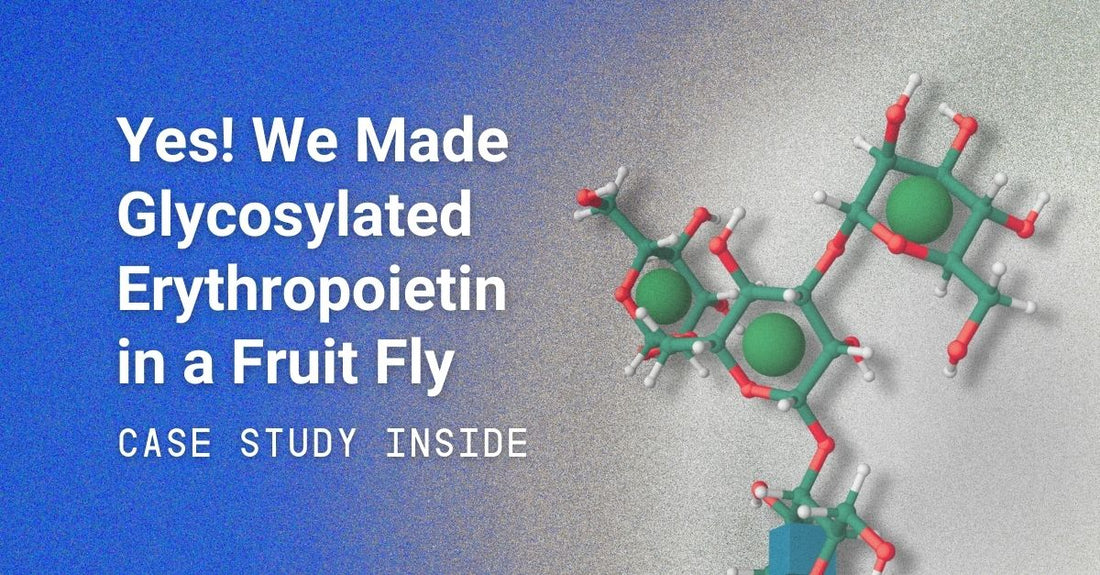“It’s great to see that your fruit fly-based EntoEngine™ platform makes glycosylated proteins of interest, but what type of glycans does it offer and is this fly-based protein bioactive?” This is a common question we get from fellow protein engineering scientists and executives. To address it head-on, our team chose Erythropoietin (EPO) as a model protein, shedding light on the glycans offered by the EntoEngine platform.
Our recent case study with recombinant EPO, a critical hormone involved in erythropoiesis, represents a significant step in understanding the glycans presented by Future Fields’ protein production platform, the EntoEngine.
The Struggles Are Real
When it comes to recombinant protein expression systems, a range of options are available, including E.coli, yeast, plant cells, insect cells, mammalian cells, and various cell-free expression systems. Each has its own unique set of pros and cons. For example, mammalian cells produce glycosylated proteins but often involve higher production cost. E.coli is an uncomplicated system but offers limited post-translational modification of proteins. Plant cells show immense potential to produce diverse proteins but involve complex downstream processing. There is no single solution for recombinant protein expression, but when it comes to efficiently producing bioactive glycosylated proteins, current status quo systems struggle to deliver. Therefore, the recombinant protein industry urgently demands an alternative platform to overcome these limitations.
(See below for an article providing an overview of recombinant protein production).
Benefits Are Revolutionary
What the EntoEngine platform offers is a distinctive, easily adaptable custom protein expression process that delivers:
- Targeted & Controlled Expression: The EntoEngine uses the GAL4-UAS system, allowing targeted gene expression in specific tissues or developmental stages of fruit fly (Drosophila melanogaster). Additionally, protein expression can be finely controlled through inducible promoters that can be activated by variables like temperature giving full control on when and where your protein of interest is produced.
- Cost-Effectiveness: Our whole-insect protein expression approach eliminates the need for the expensive, conventional bioreactors, making large-scale production incredibly cost-effective. This is partly due to the low-maintenance and rapid growth of the transgenic fruit flies, enabling a sustainable upscaling at a lower cost.
-
Functional Difficult-to-Express Proteins (DTEPs): A key feature of our platform is the ability to tackle DTEPs that are insufficiently expressed by conventional methods. Crucially, our platform also enables the expression of N-glycosylated proteins, a vital post-translational modification required for many recombinant proteins.
(See below for an article providing an understanding of DTEPs).
Erythropoietin Production With The EntoEngine
We chose Erythropoietin, the first glycosylated recombinant protein approved by the FDA for human use, to demonstrate the capability of the EntoEngine.
- Glycopeptide Analysis: EPO expressed in our EntoEngine system exhibited consistent N-glycosylation across all three sites (Asn24, Asn38 and Asn83) in various batches of EPO; these are essential for its pharmacokinetics, and immunogenicity. (Detailed information on the glycans can be found in the full case study).
- Bioactivity: Not only is the EntoEngine capable to produce glycosylated recombinant proteins cost-effectively, but it is also equipped to express functional proteins as evaluated by proliferation in TF-1 cells. (The EC₅₀ - effective concentration value can be found in the case study).
- Glycan Comparison: Unlike some insect cell systems that have the immunogenic non-human α-1,3-linked fucose cores, our whole-insect platform delivers safe fucosylation patterns. This is a distinguishing feature of the EntoEngine platform, making it a superior choice for producing therapeutic proteins.
Why Does This Matter?
This case study demonstrates that Future Fields’ proprietary EntoEngine technology can produce functional, glycosylated recombinant proteins using a whole-insect approach, entirely without the need for expensive bioreactors. This represents a significant advancement in the field of recombinant protein expression, offering a sustainable, customizable, cost-effective, and highly controllable platform.
Have a protein of interest? Ready to delve deeper into how the EntoEngine™ platform works?
Access the full data of our Erythropoietin case study below!

